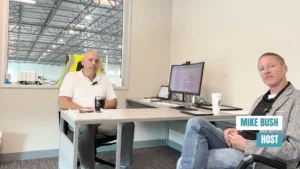The Positives and Negatives of Nearshoring
It’s no secret that the global supply chain has experienced massive disruption over the past two years. Many experts and observers have suggested that the solution for American companies is to nearshore manufacturing.
As David Beaird, President at Beaird Supply Chain and Operational Solutions, points out, nearshoring has its positives and negatives, and it’s worth considering both sides of the equation.
Read David Beaird’s Insights:
In regards of nearshoring supply chains to the United States, there are two trains of thought on what the impact would be. 1) It would be nice to have our goods and services closer to the United States from a security perspective, be it national security or intellectual property security or pharmaceutical security.
It’d be nice to be able to be self-sufficient in that. And it’s not necessarily just the United States. It can be the Western hemisphere or the north American continent. I think from a security perspective, it would be a good thing. Now, would it mitigate other challenges we’re seeing like just in time and shortages and things like that?
It depends because there’s a lot of there’s a lot of inertia that has set the global supply chain of the last 30 years since the nineties. And being able to decouple that, to bring it back to the United States or back to north America would be very difficult and it would be time assuming, it would take a period of years.
So, it’s not like we can just snap our fingers. And re-shore, or near-shore the entire supply chain. So, we would have to be smart about elements of the supply chain we would bring back. Again, I would start with pharmaceutical type stuff and make drugs again, like our antibiotics that we’ve outsourced to China and some other nations in Asia where they might not have our best interests at heart.
If I look at the challenges of nearshoring – they’re two-fold. It’s inertia and cost. So, inertia, meaning that we literally have spent the last 30 years, and part of that was coming out of the cold war, the hypothesis at the time was nations that do trade, do business together will not fight each other. And so it was seen as we would be intertwined dramatically and conduct business with each other with each portion of the planet specializing in something. So, America gave up jobs to China and other Asian countries because the cost of labor, the input cost of labor was very low. And then the thought would be America and Western economies would be more service economies and consumer economies. So, that inertia set businesses are designed for that reality. The profit margins that they enjoy is because of the labor costs that you would not be able to get here in the United States.
You might be able to get some element of it in Central and South America. And that’s where I think we need to not look at nearshoring as just a move back to the United States. It’s more of come back to the continent, come back to south America. I think you can get some of that labor arbitrage that you have in China.
You could get that over here and then save some of the higher technical jobs for folks inside the United States. So, you have that inertia that the businesses can be hard to decouple and come back. And then 2) the input cost of your products. Like, if think about your cell phones, be it a Samsung or iPhone, your input costs will go up dramatically causing the price of that product to increase.
That’s a tax, if you will. And I don’t know if Americans are willing to pay for that. The concept: Most Americans believe in bringing manufacturing back. But then, okay, are you going to pay what you got to pay to do that in your consumer goods? So now if you start to think about impacts in doing that or things you could see around here, I think, and I’m a big fan and a proponent of smart near shoring and re-shoring. Especially if you start thinking about in Latin America, if you have a lot of business going there, you have business, you have stability, you have a prosperity and that brings security and you can restabilize areas of Latin America that are destabilized now.
And it can have a lot of other benefits down the road. For the United States, we can, instead of just having this education mess that we’re in now, because everybody’s pursuing a college degree and, in many cases, the college degrees are not worth the paper they’re printed on.
Maybe we reset education into technical things, high tech type jobs where you’re doing automation of processing, where you’re doing other automation activities around manufacturing and distribution and logistics, supply chain network optimizations and all that kind of smart stuff. IT/IP intellectual property stuff.
And you go from a service economy back to a manufacturing economy with an accurate manufacturing economy, it’s high-tech type manufacturing that we could absorb here. And then your input labor, what you would do in other parts of the hemisphere.
And there’s a lot of goodness in trying to do this and, oh, by the way I’ll hit it again. The national security components of having your prescription drugs, where they can’t be cut off by bad actor or different companies in different countries or aided by the government is stealing intellectual property.
That someone developed here in the west. You get some security, you get some stability, you get a shorter supply chain with shorter lead times, but you’re going to have to pay a lot more for it. And you’re going to have to you’re going to have to go against a lot of what has been learned over the last 30 years.
In theory, love the idea. In practice it’s going to be very hard to see how in totality it can happen. It would be nice that certain elements of those chains come back home here to America. There are plenty of places in the country that were blighted when manufacturing left, places like Louisiana, Mississippi, Alabama, Georgia, Montana, the Midwest, the Carolinas, there are plenty of people that had really good manufacturing jobs that went away. So, the question is how do we get things like that back? Get them in those areas where we can do something better with the total delivered cost of many goods and services we consume.









